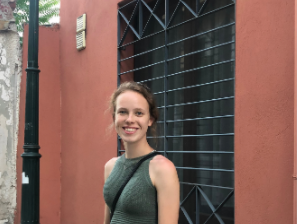InterSEXtions discussion addressed gender-based violence in queer communities of color
Lesbian, bisexual and heterosexual women are victims of rape at rates of 13.1, 46.1 and 17.4 percent respectively. When all sexual violence is included, those numbers rise to 46.4, 74.9 and 43.3 percent, and when race/ethnicity is considered, the incidence of all types of sexual violence are astronomically high for women of color, specifically black, multiracial and Indigenous populations.
The lack of research and overt outrage over such statistics, which are likely underreported, motivated Case Western Reserve University advocate Megan Long to host a discussion, “InterSEXtions,” discussing intimate partner violence in queer communities of color, on Oct. 1.
Megan Long is the advocate for Gender-Based Violence Prevention and Response at CWRU, as well as a survivor advocate from The Cleveland Rape Crisis Center and a licensed social worker. She offers free and confidential walk-in services and sessions to discuss any form of gender-based violence at the LGBT Center, University Counseling Services and the Flora Stone Mather (FSM) Center for Women, an alternative to mandated reporters on campus such as faculty, orientation leaders and residential assistants. Working with the CWRU community, Long listens to people, establishes safety plans and explains potential avenues to address gender-based violence, including knowing one’s rights through the carceral system.
Last year, after activist Tarana Burke, founder of the #metoo movement spoke at the Maltz Performing Arts Center, Long along with with Office of Multicultural Affairs Director Naomi Sigg, wanted to create a space for people, especially people of color and members of the LGBTQ+ community, who had experienced sexual or gender-based violence. Long hosted a few conversations last year, but hopes to have more discussions this year in an effort to “reach out to communities that we know are disproportionately affected by any type of gender- or power-based violence.”
Long started the discussion asking why no one is talking about these statistics and the people behind them, and why we are not talking about violence in same sex relationships. In the small, intimate discussion, CWRU community members discussed the role of explicit and implicit biases, and how the systems, criminal justice and legal, as well as social perceptions and stereotypes obstruct survivors’ rights to respond to their violence. Particularly, the barriers which complicate the ability to report gender-based violence, especially in queer communities of color, were analyzed. These barriers include the stigma around being LGBTQ+, fear of calling the police, lack of avenues for undocumented people and pushback from communities for speaking out and drawing attention.
The expectations perpetuated by society about what a survivor looks like overlook and exclude many people experiencing gender-based violence. As a result, the appalling statistics which started the discussion are likely underreported.
“It is important that we understand how many barriers people face just because of who they are,” said Long.
The discussion, first of many to come that will seek to address where gender-based violence intersects disproportionately affected communities, was held on the first day of domestic violence awareness month. The Domestic Violence Awareness Project (DVAP), a national organization which united multiple different programs designed to raise awareness and educate the public about domestic awareness, encouraged people to start their advocacy with #1Thing.
“One person’s actions may seem insignificant, but together a communities’ collective ‘#1Things’ can lead to real social transformation,” explained the project’s website.
This theme, emphasizing the impact of individual actions or words, reverberated through the InterSEXtions discussion.
While there are ways to support the cause by volunteering time or donating money, other more “passive” signals were discussed as a way to discreetly show support; for example, having a Safe Zone sticker posted outside your door. Furthermore, the CWRU community in attendance discussed the importance of simply listening to people and engaging in bystander intervention, so as to “not perpetuate racist, sexist, or homophobic behavior.”
“Sometimes we are quick to jump into problem solving mode,” said Long. “However, being able to hold a space for someone being so vulnerable is huge. We need to believe survivors, validate their concerns and never ever blame them for what happened to them.”
In the vein of #1Thing, Long ended the discussion emphasizing how microscopic actions can have a macroscopic effect.
There are many resources on campus and in the greater Cleveland community available for anyone to utilize. The Cleveland Rape Crisis Center, the FSM Center for Women, the LBGT Center and University Health and Counseling Services all offer services and sessions for people experiencing gender-based violence.

Jordan Reif is a fourth-year student studying political science with minors in biology and chemistry. When she’s not in one of her three PE classes this...

